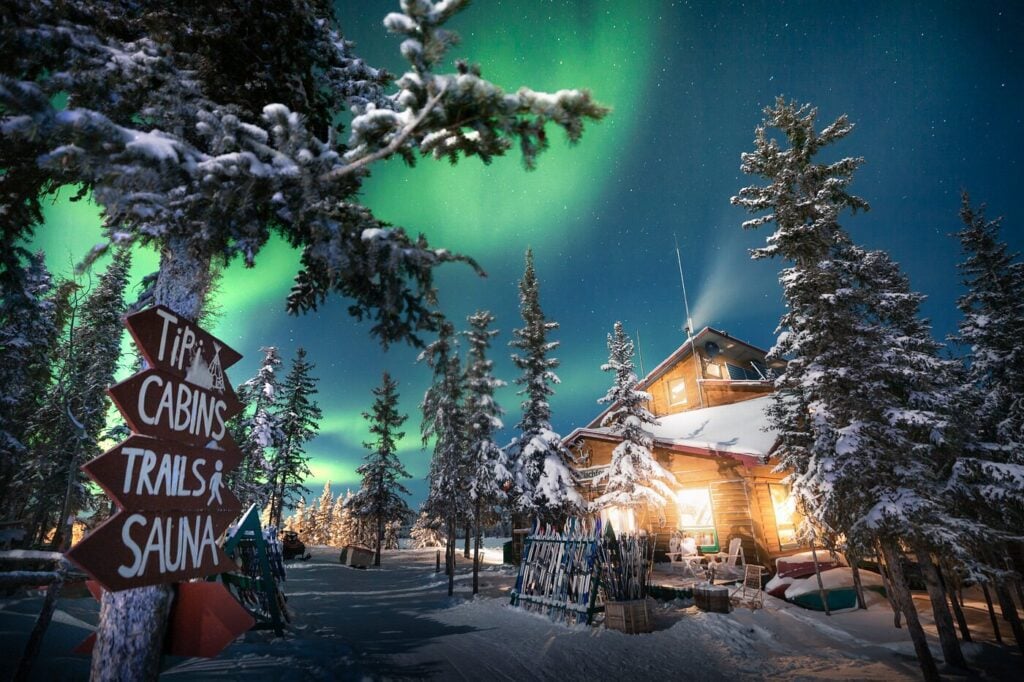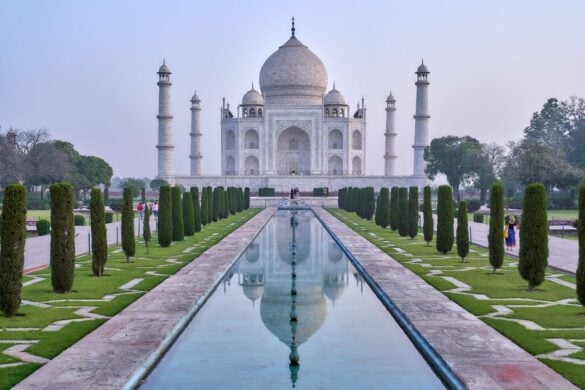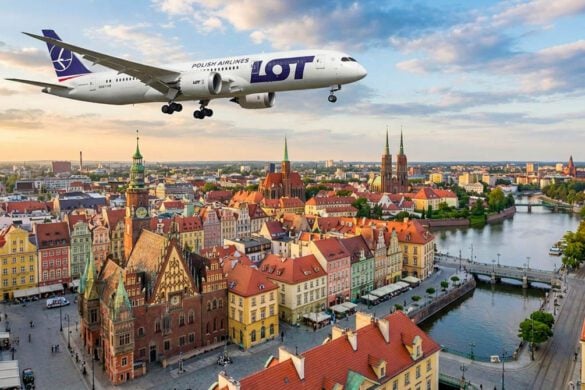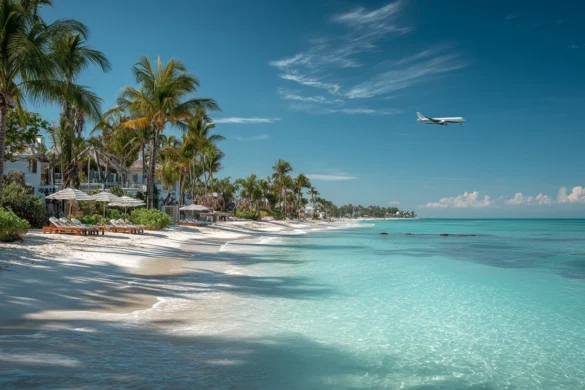You’re lying in a heated glass igloo while emerald light dances across the Arctic sky. Snow settles on the transparent roof. It’s silent, unreal, and exactly why chasing the aurora is worth crossing an ocean for.
I’ve seen the northern lights close to ten times. Location matters, but setup matters more. You can watch from a hotel lot, or you can watch from a hot spring, a glass dome, or the deck of an icebreaker. Here are 15 bucket‑list aurora experiences that pair the lights with something unforgettable in 2025–2026’s solar‑max window.
Aurora Planning Bar: Quick Essentials
- 🌙 Moon phase matters: Aim for dark skies – avoid full moon ±3 nights for the clearest views.
- 📈 Watch the KP index (0–9): Higher KP means the aurora reaches further south. KP 5+ can light up skies well below the Arctic.
- ⏳ Stay 3+ nights: Aurora hunting is a numbers game. A long weekend dramatically boosts your odds of a sighting.
- 📷 Camera cheat sheet: f/1.8–2.8, 6–15 sec shutter, ISO 800–3200, manual focus to infinity – tripod essential.
- 🔗 Forecast tools: NOAA SWPC, Icelandic Met Office
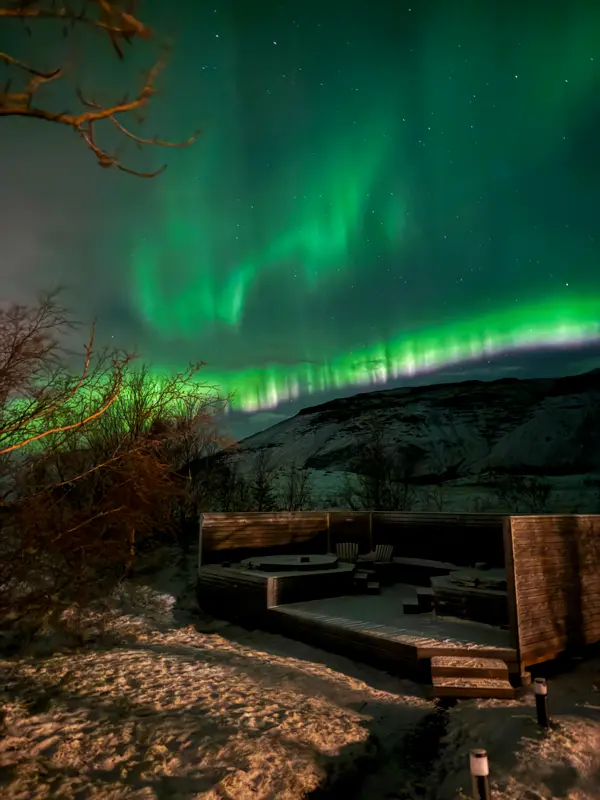
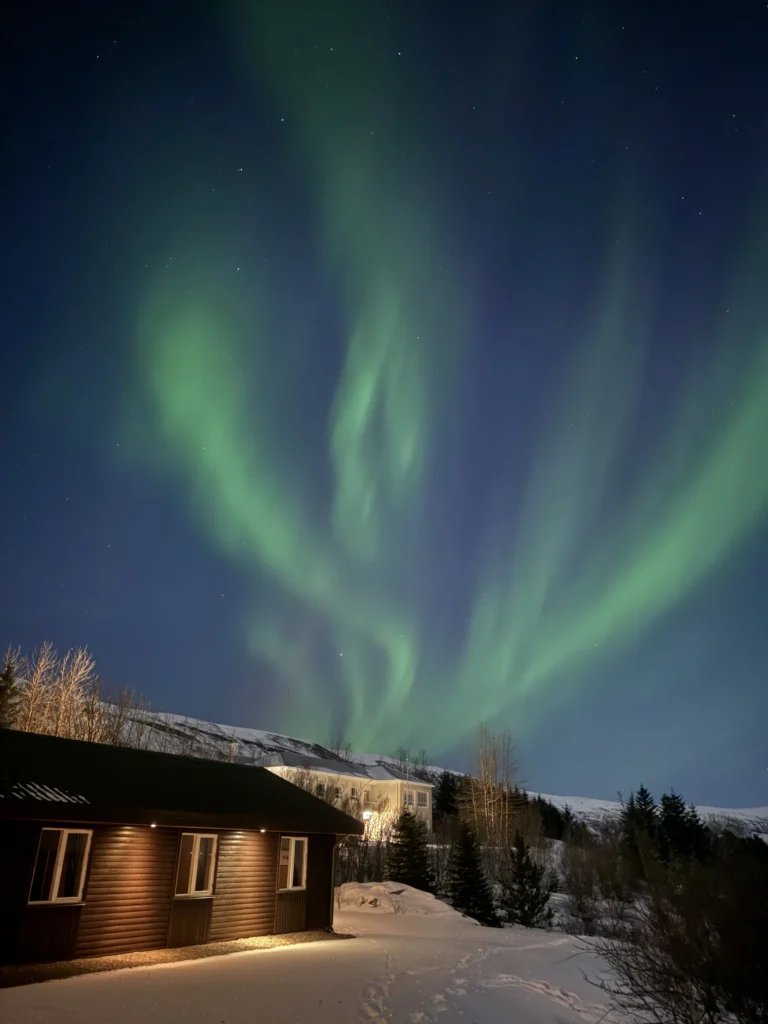
Why 2025 Is The Year
If you’ve ever dreamed of seeing the aurora, 2025-2026 is the year to do it. We’re in solar maximum, which means the sun is at its most active and the northern lights is brighter, stronger, and more frequent than they’ve been in decades. Of course, it’s not just about the sun…dark skies, moon phases, and clear weather are what actually make or break your trip.
On a handful of nights each year, a big solar eruption (geomagnetic index Kp 7 or higher) can push the auroral oval much farther south than usual. The result: skywatchers in U.S. states as far south as Oregon, Colorado, Missouri (even occasionally Arkansas or northern California) have caught faint auroras on the horizon during these intense storms. Recently, the lights have even been visible where I live…just outside of Boston. That’s how intense the aurora activity has been lately! Though you have a much better chance at seeing them way further north, preferably in the Arctic Circle. This is the best year so far in my adult life to see the aurora borealis, so keep reading to see some of the most life-changing travel experiences imaginable.
- Know before you go: I highly recommend getting travel insurance before planning any of these adventures, as extreme weather cancellations are definitely a thing this time of year. It’s a good idea anyway, especially whenever you book pricey vacations abroad.
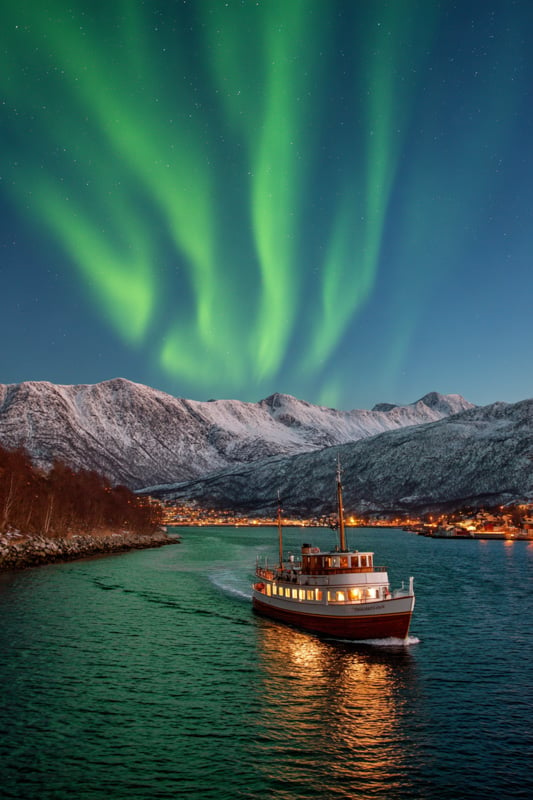
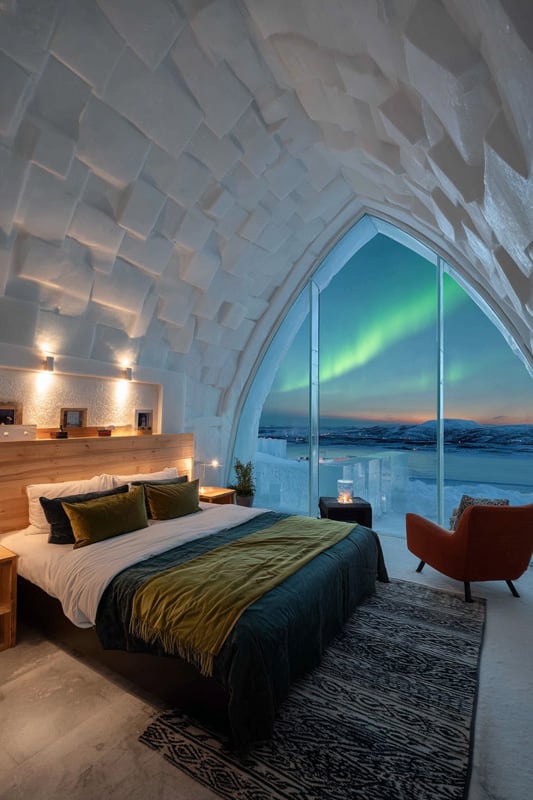
Where To Go By Month (Quick Planner)
I’ve learned the aurora season has distinct rhythms depending on where you go. Here’s a quick month-by-month cheat sheet so you can line up your trip with the best odds.
- September–October → This is when the season kicks off. Iceland campervan road trips give you the freedom to chase clear skies on short autumn nights. In the Arctic, Finnish Lapland igloos are already firing with reliable displays.
- November → My favorite “sweet spot.” Skies are darker for longer, but winter storms haven’t fully set in. Tromsø in Norway is at its best for guided safaris, Abisko in Sweden and the ICEHOTEL deliver some of the world’s clearest skies, and in Canada, Churchill offers the rare polar bear + aurora double feature.
- December–February → Deep winter and the most dramatic landscapes. Alaska’s Chena Hot Springs is unbeatable for watching lights from steaming pools, Svalbard’s polar night means auroras can appear at noon, and Norwegian coastal cruises give you a moving front-row seat under the oval.
- March–April → The season winds down but can still be spectacular. Iceland’s Ring Road is easier to drive as daylight returns, Yukon wilderness lodges still sit under crisp skies, and even Scotland’s Highlands can erupt with surprise aurora storms late in the cycle.
The Best Northern Lights Experiences Around the World
1. Sleep Under the Stars in Finnish Glass Igloos
Sleep in heated glass domes with panoramic sky views at the world’s first glass igloo resort.
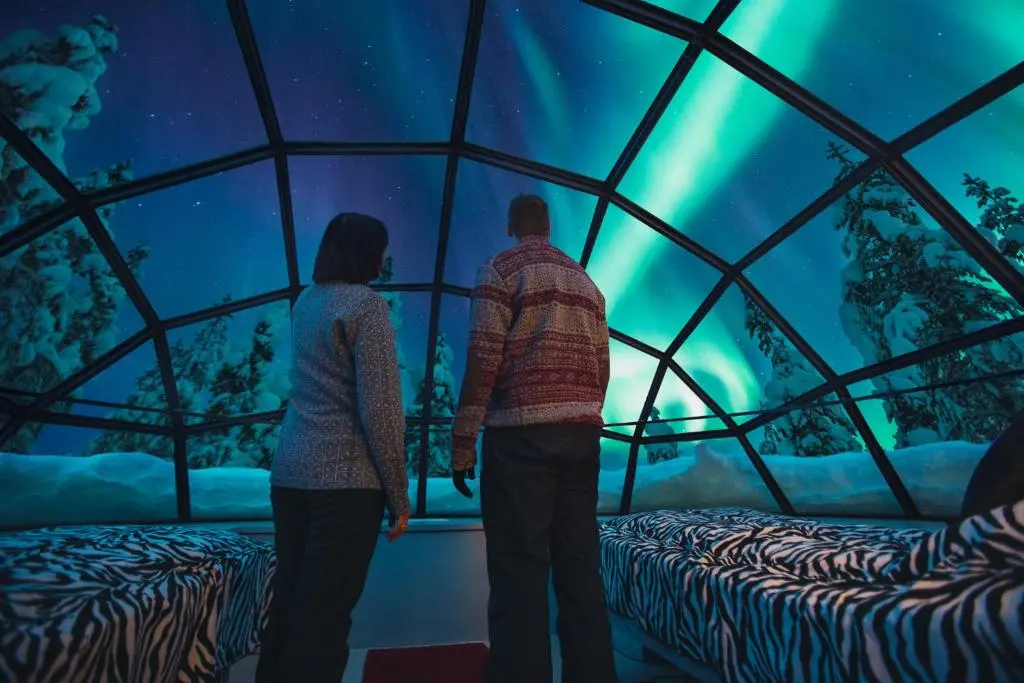
Imagine drifting off to sleep in a heated glass dome as the aurora borealis dances overhead. Welcome to Kakslauttanen Arctic Resort, the world’s first glass igloo resort that’s been perfecting this magical experience since 1999.
These thermal glass igloos maintain a cozy 21°C (70°F) even when temperatures plummet to -30°C outside. The anti-fogging glass is strategically positioned away from light pollution, giving you an unobstructed 360-degree view of the Arctic sky.
Choose East Village for a cozier, tree‑lined feel or West Village for wider sky views. Both include underground-connected heated bathrooms…because nobody wants to brave -30°C for a midnight bathroom run.
Beyond the aurora alarm service that wakes you when the lights appear, you’ll find an on-site reindeer farm, husky kennels, and a traditional smoke sauna. The resort even serves authentic Indian cuisine alongside Nordic fare…a surprising cultural touch this far north.
Peak season runs September-October and February-March. Glass igloos start at €415-424 per night including half-board (breakfast plus three-course dinner). For the ultimate experience, upgrade to Kelo-Glass igloos featuring private saunas and fireplaces.
- Book Direct: Kakslauttanen Official Site
- Alternative option: Arctic TreeHouse Hotel in Rovaniemi offers glass-walled suites from €380/night.
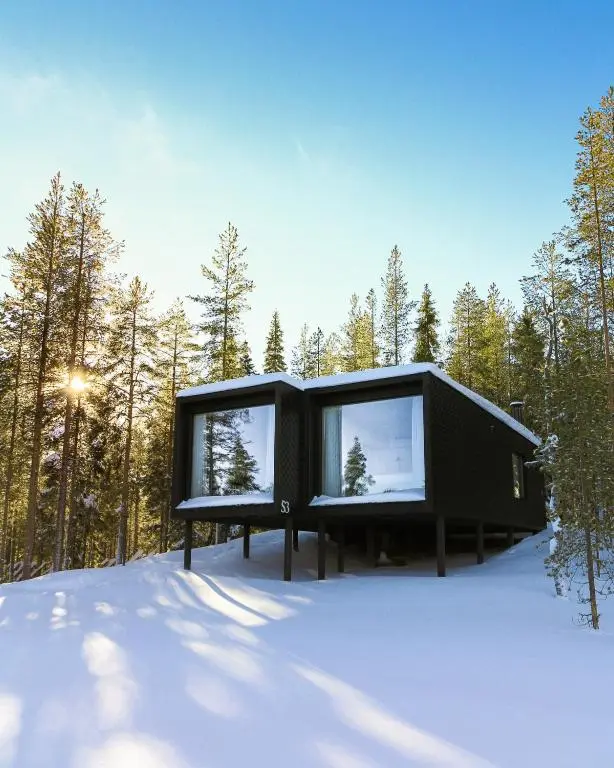
2. Sleep in Art: Sweden’s Legendary ICEHOTEL
Sleep in a room carved entirely from ice with special cold-weather sleeping bags rated to -8°C.
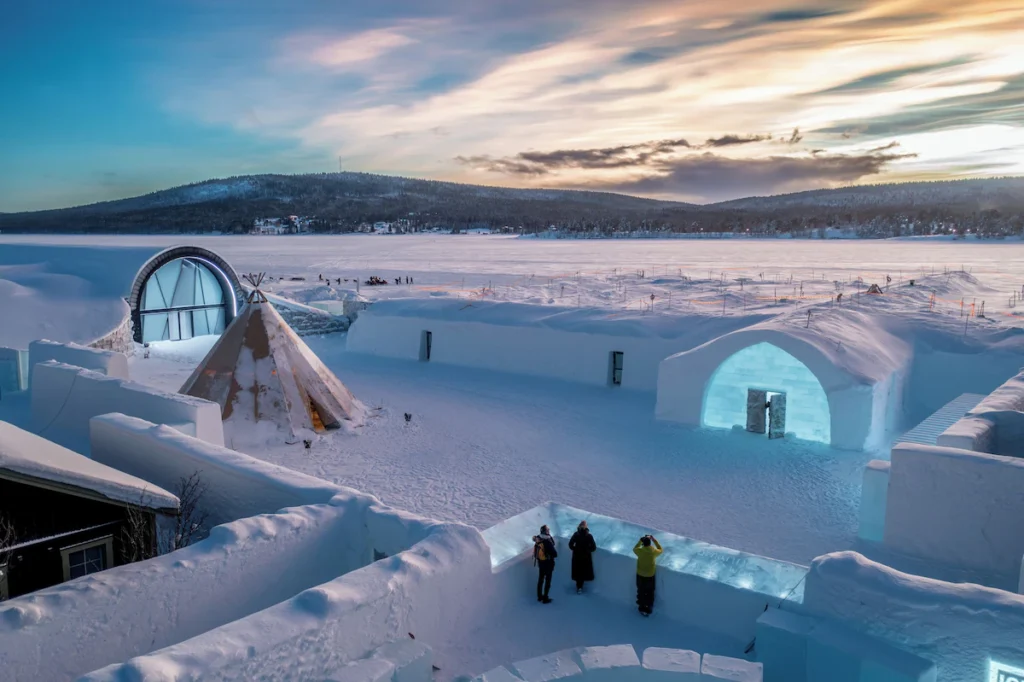
Every winter since 1990, international artists gather in Jukkasjärvi to create the world’s most ephemeral hotel…rooms carved entirely from ice that melt away each spring, ensuring no two visits are ever the same. Located in Abisko’s aurora oval (statistically the best place on Earth for Northern Lights), each ice room at ICEHOTEL is a unique art installation maintaining temperatures between -5 to -8°C. You’ll sleep in special arctic sleeping bags on reindeer hides, surrounded by sculptures that exist nowhere else in the world.
Start your evening at the ICEBAR with cocktails served in ice glasses, then retire to your frozen masterpiece. The hotel’s location provides easy access to the Aurora Sky Station, a chairlift ride through Arctic wilderness to reach a 900-meter viewing platform in Abisko National Park. It’s famous because of its “blue hole” microclimate that creates permanent cloud gaps and offers an 88% chance of seeing the aurora over three nights. It costs SEK 1,190 per person (approximately £114) for the Night Visit package. Premium dinner upgrades available for those wanting to arrive hours early and make an evening of it.
Standard ice rooms start from €200/night, while art suites can reach €600-1000+ during peak season. I recommend doing a day visit if you want to experience the artistry without the overnight commitment. The hotel operates December through April (it literally melts in spring). January-March offers peak aurora conditions with maximum darkness hours.
✈️ My #1 Hack for Cheap 2026 Flights:
It’s January, so flight prices are climbing fast—but you don't have to pay them. I’m currently seeing roundtrips to Europe for under $300 (deals you won’t find on Google Flights).
Step 1: Join Going.com's Free Plan here. It takes 10 seconds and requires no credit card.
Step 2: If you're doing a big trip this year, grab the 14-day free trial of Premium. You can even use my code JON25 for 25% off.
Seriously, this is the single best money-saving tool I’ve used in 8+ years.
👉 Send me cheap 2026 flights- Book Direct: ICEHOTEL Official
- Recommended Tour: Join a local Sami guide on a guided tour to the charming village of Jukkasjärvi and the Icehotel (via GetYourGuide).
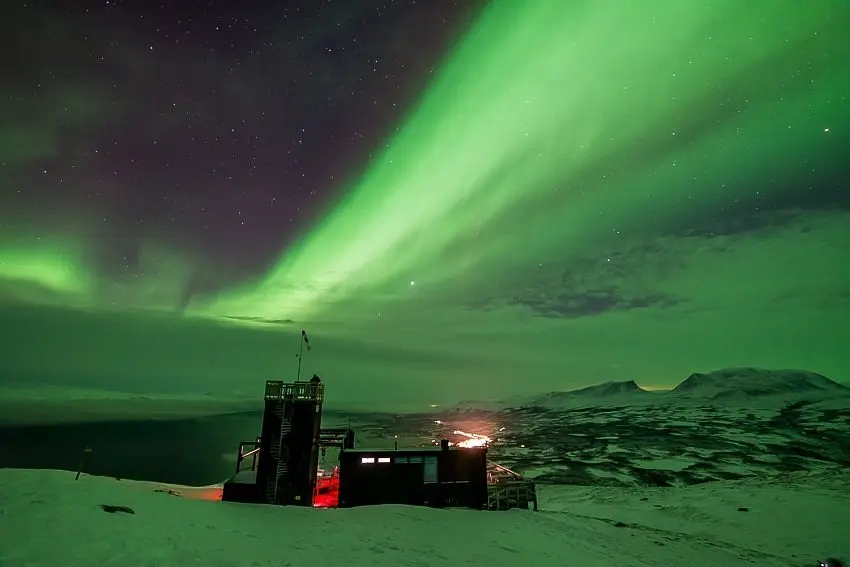
3. Luxury Aurora Safari in Tromsø, Norway
Private guides take you to remote locations by snowmobile, dog sled, or boat based on weather conditions.
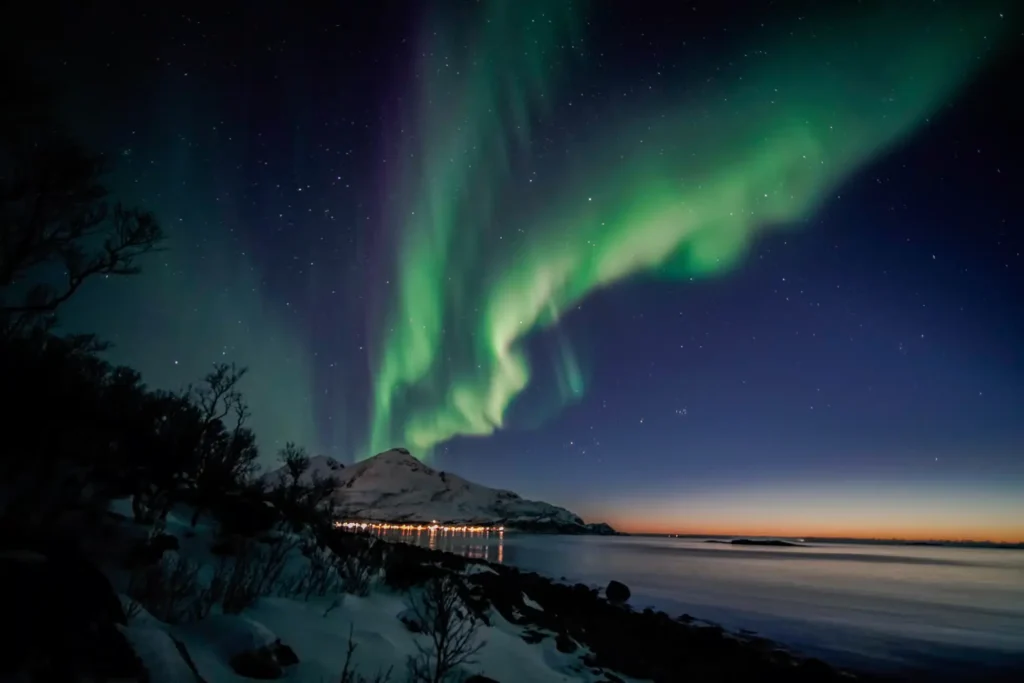
Forget crowded tour buses filled with tourists staring at cloudy skies. In Tromsø, positioned directly under the aurora oval, private guides use real-time weather data to chase clear skies across multiple locations in a single night…by snowmobile, dog sled, or boat depending on conditions.
Small groups (max 8 people) or private tours mean personalized attention from professional photography guides. You’ll visit traditional Sami lavvu tents for hot drinks and storytelling while guides monitor aurora forecasts in real-time. Even boat tours work in cloudy weather. Aurora reflections on fjord water create stunning photography opportunities!
- Private Photo Tours from €650/group: Northern Lights Tromsø
- Recommended Aurora Tours: Tromsø Aurora Tours via GetYourGuide. I recommend these tours by Arctic Breeze AS and Northern Horizon (group tours from €85/person)
- Where to Stay: Malangen Resort – Aurora domes and luxury cabins, 45 minutes from Tromsø
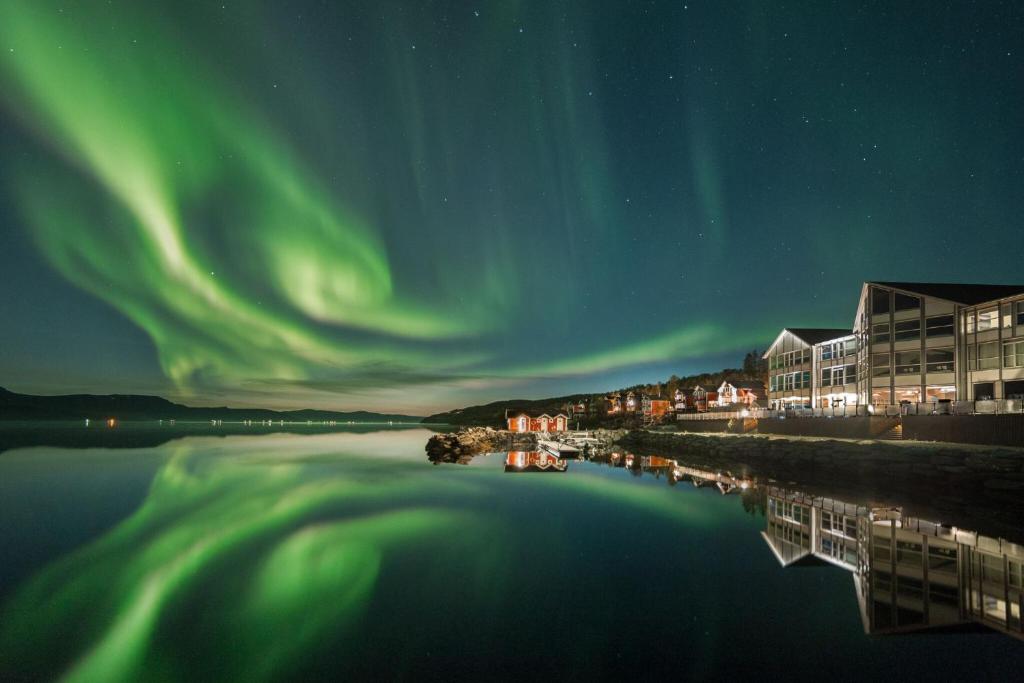
4. Svalbard Polar Night Aurora Experience
The world’s northernmost inhabited place during polar night season (November-February).
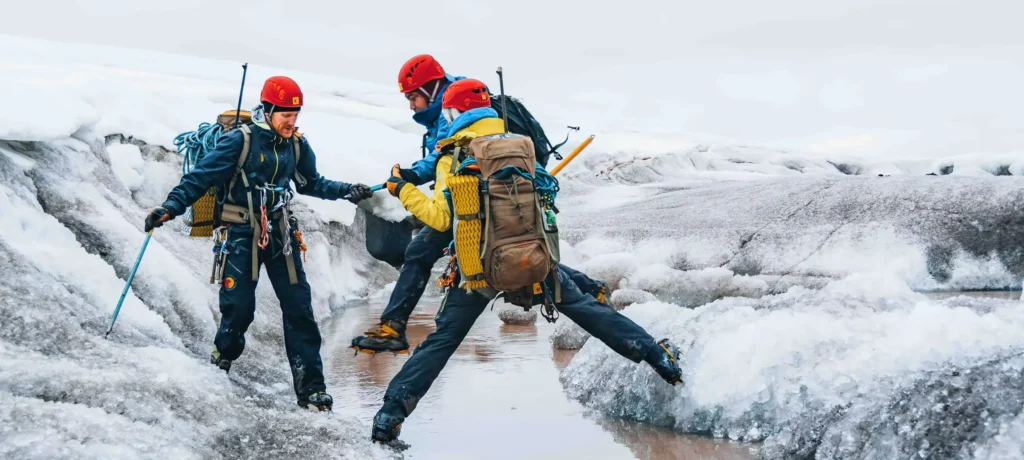
Welcome to the world’s northernmost inhabited settlement, where polar night lasts November through February and aurora viewing becomes a 24-hour possibility. Svalbard isn’t just remote…it’s literally the edge of civilization, where polar bears outnumber humans and there isn’t a single tree on the entire archipelago.
During your visit, you can expect to see the aurora almost every clear night because there’s zero light pollution and Svalbard’s extreme latitude positions you directly under the aurora oval’s most active zone. The complete 24-hour darkness means you can see northern lights at noon…a surreal experience that redefines everything you thought you knew about aurora timing.
Getting there requires connecting through Oslo or Tromsø…no direct international flights exist to this remote archipelago. Once you arrive, polar bear safety protocols are mandatory outside Longyearbyen settlement. The Arctic environment is unforgiving with temperatures regularly hitting -30°C and GPS systems becoming unreliable at extreme latitudes, so serious preparation is essential.
This is northern lights viewing taken to its absolute extreme. Combine aurora hunting with polar bear safaris, glacier walks, snowshoeing adventures, and exploration of Pyramiden…an abandoned Soviet ghost town frozen in time since the 1990s. Svalbard is expensive, logistically complex, and physically demanding, but for serious aurora hunters, there’s literally nowhere more remote or spectacular on Earth.
The Polar Night Advantage: From November through February, the sun never rises, creating a months-long aurora season with optimal viewing conditions around the clock.
Tours & Expeditions:
- Svalbard Wildlife Expeditions – Aurora and wildlife combination tours
- GetYourGuide Svalbard Tours – Here are some top-rated tours that leave from Longyearbyen
Essential Resource: Visit Svalbard Official Guide – Entry requirements and polar bear safety protocols
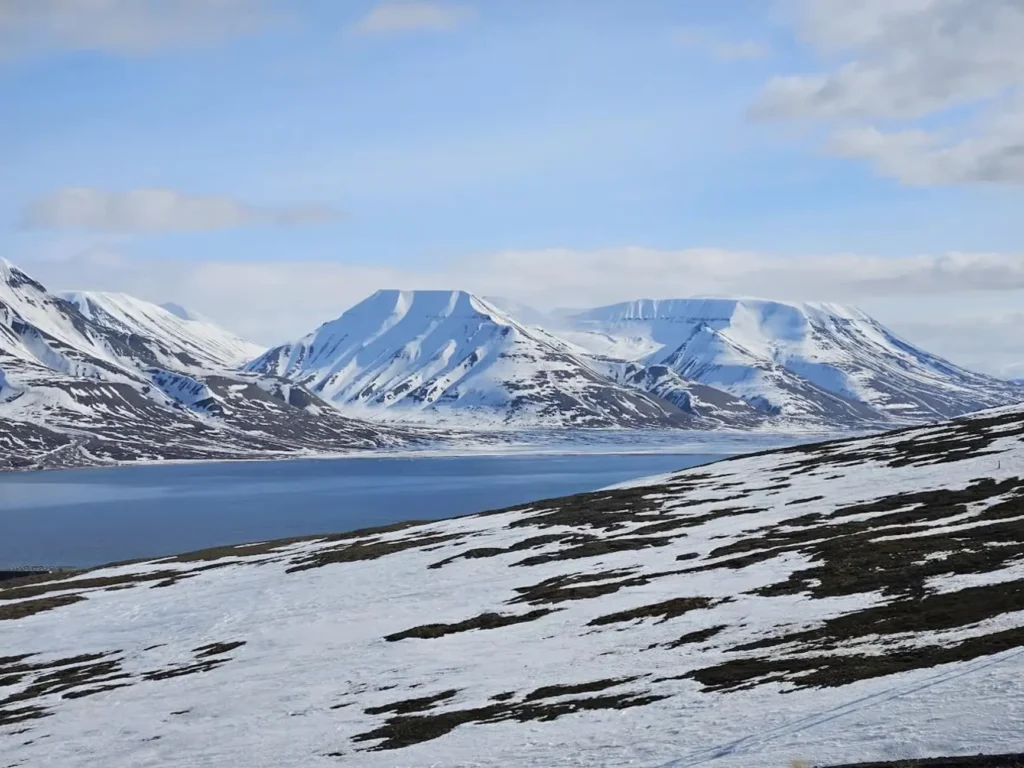
5. Norwegian Coastal Cruise: Aurora Hunting on the High Seas
Round-trip voyage from Bergen to Kirkenes aboard working postal ships that deliver supplies to remote Arctic communities.
Forget massive cruise ships packed with thousands of passengers. Hurtigruten’s “Coastal Express” operates working postal ships that deliver mail and supplies to 34 coastal communities between Bergen and Kirkenes, while you hunt aurora from heated decks.
This isn’t just a tourist cruise…you’re riding alongside locals using these ships as daily transportation. The smaller, more intimate vessels access remote fjords unreachable by larger ships, offering shore excursions to authentic Sami communities and expert photography workshops led by aurora specialists.
Hurtigruten also offers two other super unique cruises: a 15-day and 17-day land & sea tour that heads to destinations like Oslo, Helsinki, Rovaniemi, and Honningsvåg. Each offers their signature Northern Lights Promise: if you don’t see the aurora on an 11+ day voyage during season (September-March), you’ll receive a free 6-7 day cruise credit.
Classic voyages start from $2,036 (down from $2,536 with current promotions), while suite accommodations range $3,000-5,000+. Peak season January-February offers maximum darkness for aurora viewing.
- Book Direct: Hurtigruten Official
- Alternative Idea: Luxury Northern Lights Yacht Cruise with hot tub and dinner (via Viator)
6. Icebreaker Ship Experience in Finland
Board a working icebreaker that smashes through frozen seas while you watch aurora from the ship’s heated decks.
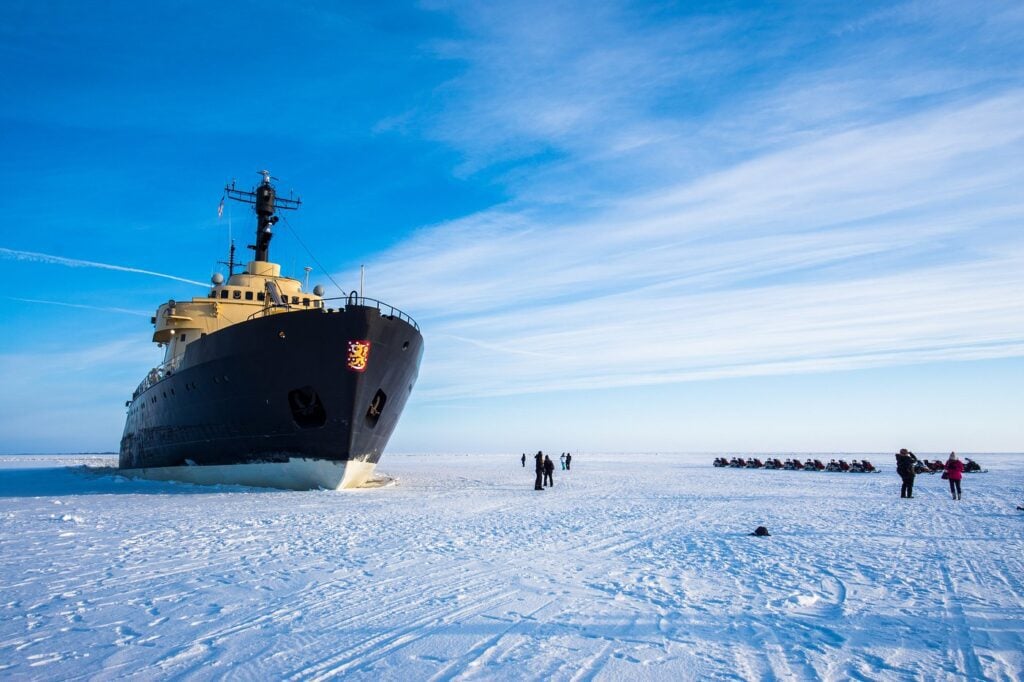
Picture yourself standing on the deck of a massive steel beast as it literally crushes through 3-foot-thick ice like it’s cardboard. The sound is incredible…a deep, rumbling crack that vibrates through your bones. Then suddenly, the engine quiets, and above you, green ribbons of light start dancing across the Arctic sky.
This is the Icebreaker Sampo experience, and it’s utterly surreal. This 1960s workhorse spent decades clearing shipping lanes for the Finnish government before someone had the brilliant idea to let tourists aboard. Now it’s the only place on Earth where you can watch the northern lights from a ship that’s actively demolishing ice beneath your feet.
But here’s where it gets really wild…they’ll hand you what looks like an astronaut suit and invite you to jump into a hole they’ve carved in the frozen sea. The survival suits are so buoyant you can’t sink even if you try, and floating in 32°F water while staring up at the aurora is a level of surreal that breaks your brain in the best way. One minute you’re bobbing like a cork in Arctic water, the next you’re warming up in an authentic Finnish sauna while the ship continues its ice-crushing mission.
The engine room tour reveals the mechanical madness that makes this possible – massive engines that generate enough power to literally climb over ice sheets. Walking on the frozen sea feels like being on another planet, especially when you turn back to see this orange-and-black monster ship sitting in the ice like it owns the place.
Season: December 19, 2025 through April 6, 2026 when the sea ice is thick enough. February-March offers peak aurora season with stable ice conditions.
Book Your Experience:
- Official Sampo Experience365 – Direct booking with transfers (morning cruise €288, afternoon with lunch €340)
- Polar Explorer Icebreaker – Sweden-based option (€240 per person)
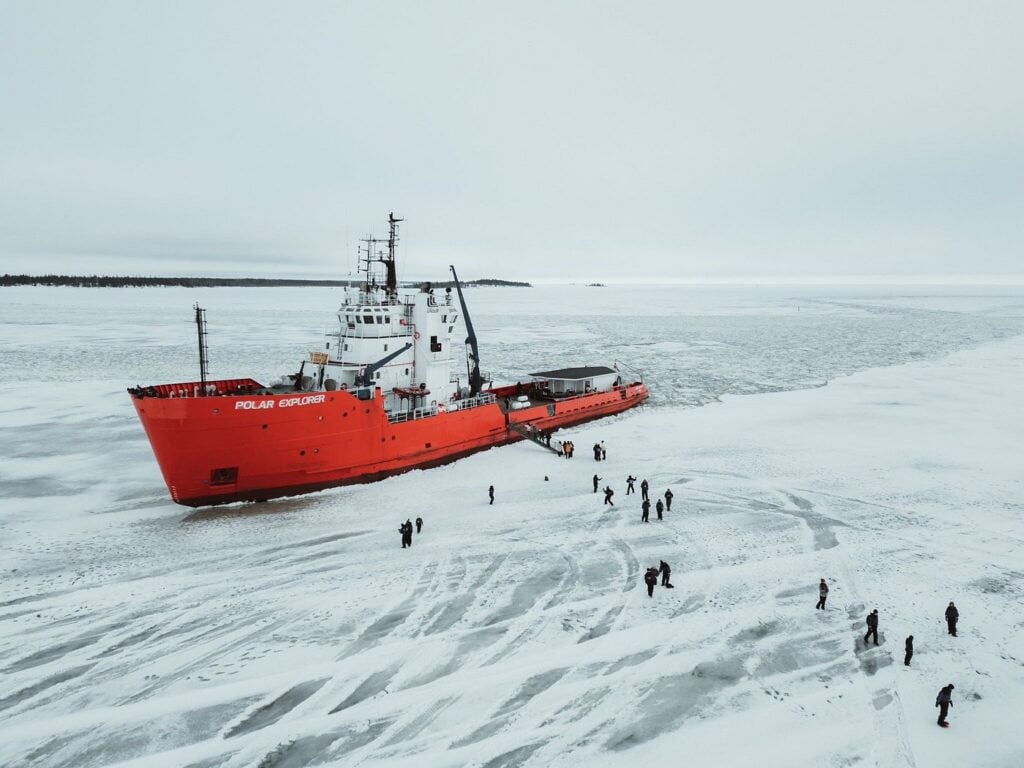
7. Iceland Aurora Boat Tours
Smaller boats (20-40 passengers) navigate close to Iceland’s dramatic coastline for reflection shots of auroras on water.
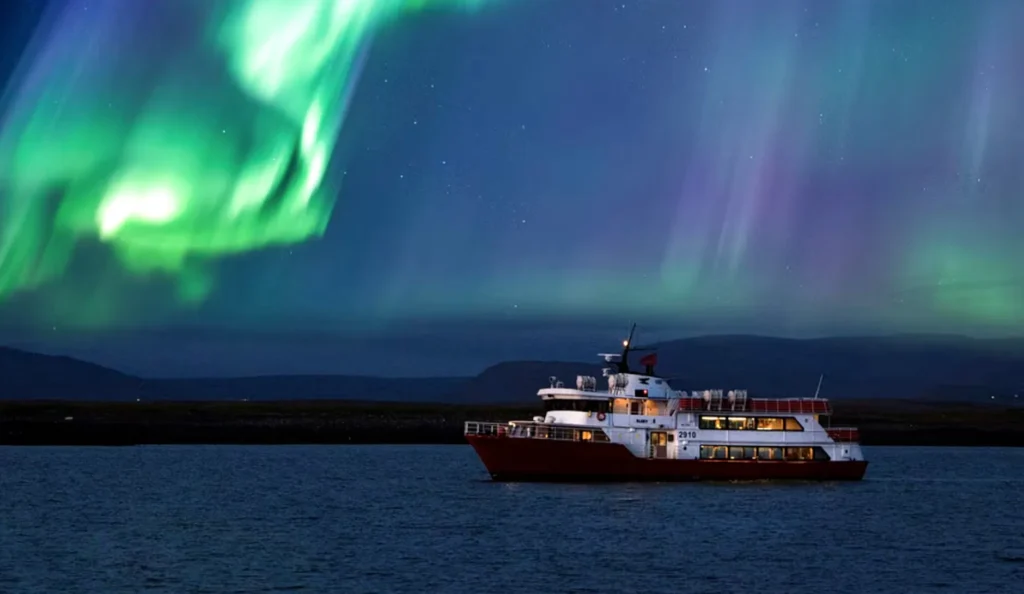
Forget everything you think you know about boat tours. Iceland’s aurora cruises aren’t some cheesy sunset dinner cruise…they’re serious aurora hunting expeditions that happen to involve boats.
Here’s why this works so well: When you’re on land and clouds roll in, you’re stuck. On a boat, you can literally chase clear skies along the coast. The Arctic Adventures boats cruise out into Faxaflói Bay where the city lights disappear and something magical happens…the aurora reflects off the water, creating this mind-bending double aurora effect that looks like the sky is melting into the ocean.
I’ve done both land-based and boat aurora tours, and the boat wins every time for one simple reason: no light pollution and no hills blocking your view. Plus, there’s something deeply satisfying about watching the northern lights while gently rocking on North Atlantic swells, hot chocolate in hand, listening to your Icelandic guide tell stories about elves and hidden people.
The best part? These aren’t massive cruise ships. We’re talking intimate boats with maybe 30-40 people max, so you’re not fighting crowds for deck space. And if you book with Elding during whale season, you might catch orcas under the aurora…which is exactly as incredible as it sounds.
Departure Ports:
- Reykjavik Old Harbor – Most departures, easiest access from downtown
- Akureyri – North Iceland, often clearer skies
- Húsavík – Combine with Iceland’s whale watching capital
Book Your Experience:
- Elding Whale Watching – Combo tours from Old Harbor ($89-120)
- Arctic Adventures – Premium boat experience ($88-97)
- Reykjavik Excursions – Classic northern lights by boat ($65-89)
Essential Planning Tools:
- Icelandic Met Office Aurora Forecast – Most accurate for Iceland (I’ve used every visit for 7 years)
- Safe Travel Iceland – Weather and sea conditions
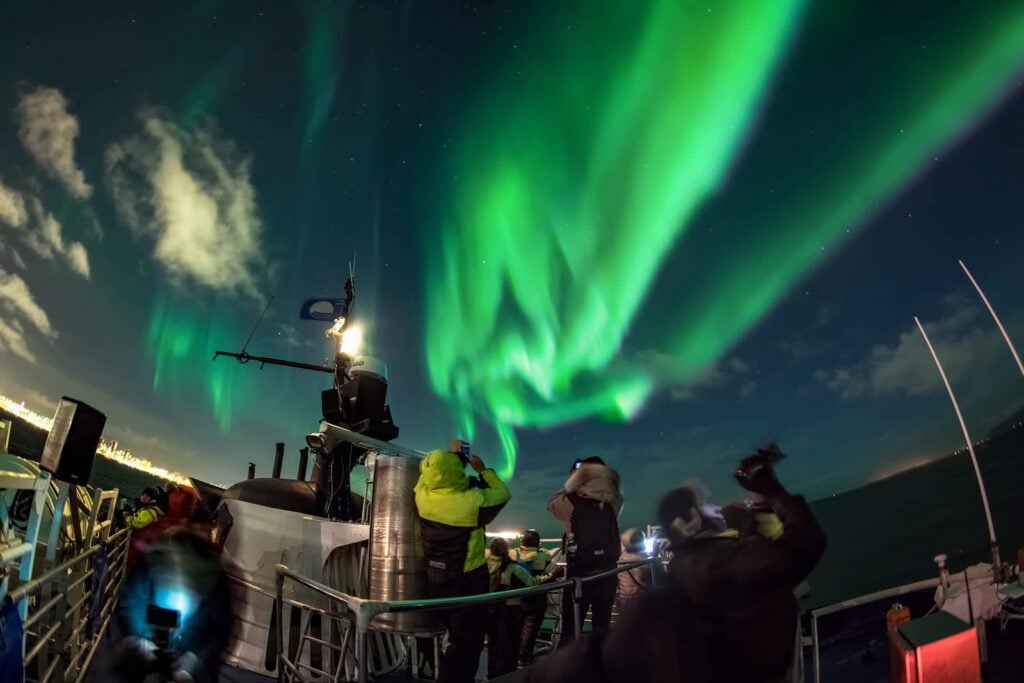
8. Exploring Iceland’s Aurora by Campervan
Complete freedom to chase clear skies around Iceland’s 1,332km Ring Road in a modified campervan with aurora roof window.
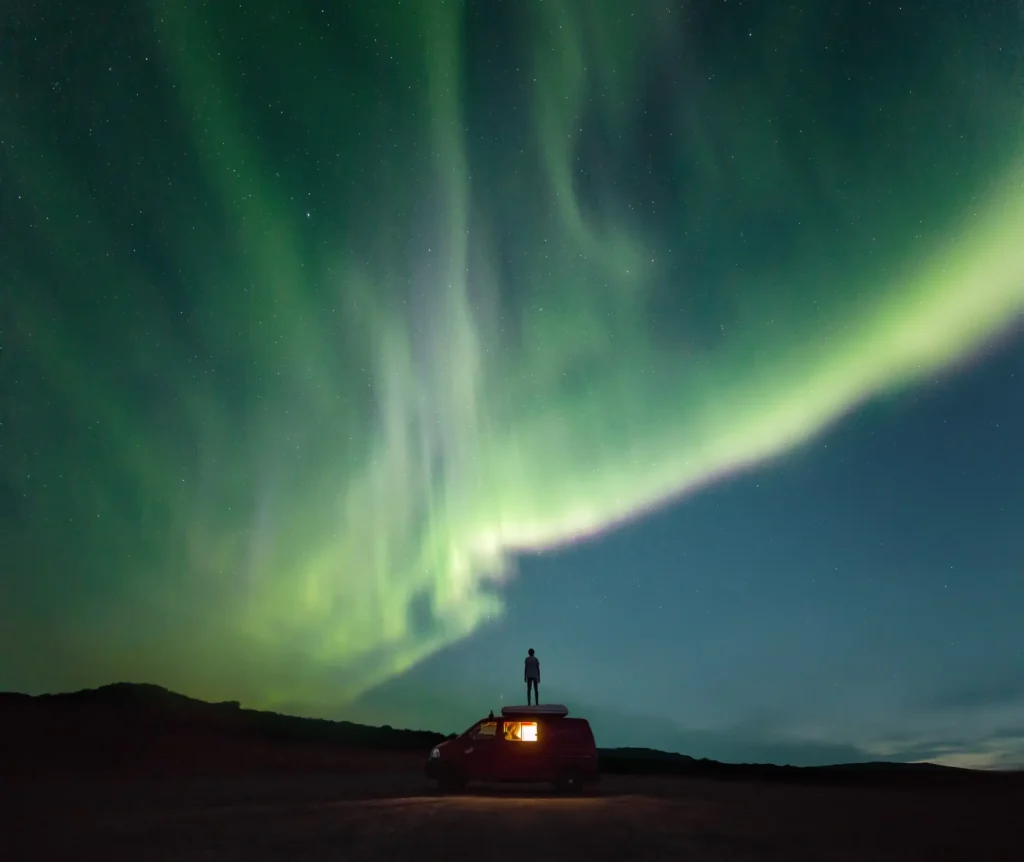
This is aurora hunting for control freaks and adventure addicts. Instead of hoping a tour guide knows where to go, you become the aurora hunter, armed with a campervan, weather apps, and the entire country of Iceland as your playground. Here’s the genius of it: Iceland’s Ring Road is basically a 1,332-kilometer aurora hunting circuit that hits every major landscape you’ve seen in photos. When clouds roll in over Jökulsárlón glacier lagoon, you drive an hour east to Diamond Beach. When light pollution bothers you near Reykjavik, you head to the Westfjords where the nearest town is 100 kilometers away. On your Iceland road trip, you’re not stuck with anyone’s schedule but your own.
KúKú Campers figured this out and started putting roof windows in their vans specifically for aurora watching. Image yourself parked next to a steaming hot spring, northern lights exploding overhead, and you can watch the whole show from your warm bed through the ceiling window. When you want a better view, you step outside, take photos, then dive back into your mobile basecamp.
The freedom is intoxicating. I’ve watched aurora reflect off icebergs at Jökulsárlón, seen them frame Kirkjufell mountain (Iceland’s most Instagrammed peak), and caught them dancing over Seljalandsfoss waterfall where you can literally walk behind the falls. Try doing that on a bus tour. But let’s be real…this isn’t for everyone. You’re driving potentially sketchy roads in winter weather, sleeping in a van, and cooking your own meals. But for the right person, it’s aurora nirvana.
- Read also: My Favorite Iceland Northern Lights Tours
Book Your Van:
- Kuku Campers – 4×4 vans with roof windows from €89/day
- CampEasy – Budget option, 2WD from €65/day
- Happy Campers – Mid-range 4×4 from €75/day
Can’t-Miss Aurora Spots:
- Jökulsárlón Glacier Lagoon – Auroras reflecting on icebergs
- Kirkjufell Mountain – Most photographed mountain in Iceland
- Westfjords Peninsula – Least light pollution, best viewing
- Seljalandsfoss Waterfall – Walk behind the falls under aurora
Aurora Chasing Arsenal:
- Vedur.is – Cloud cover maps for chasing clear skies
- Road.is – Road conditions and closures
- Park4Night App – Legal camping spots with facilities
Campervan Pro Tips:
- Book 4WD for winter – some roads require it
- Stock up on food in Reykjavik – rural grocery stores are expensive
- Download offline maps – cell coverage is spotty in highlands
- Bring extra batteries – cold drains camera batteries fast
- Pack warm sleeping bags rated to -10°C minimum (the wind is no joke here)
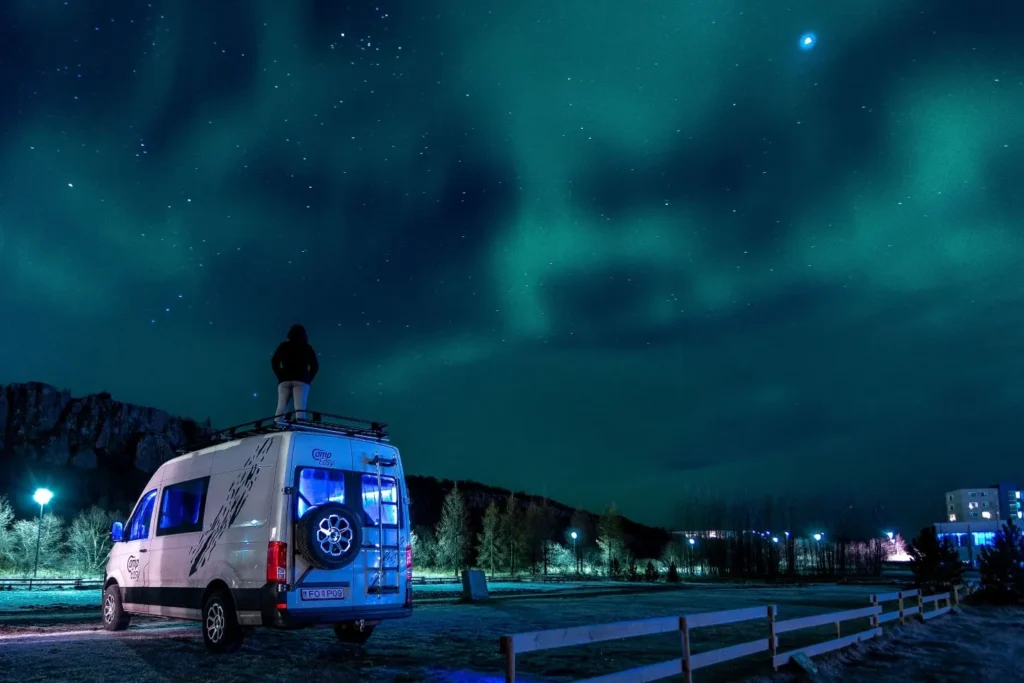
9. Lofoten Islands Road Trip in Norway
Drive between fishing villages connected by bridges and tunnels through dramatic Arctic peaks that rise directly from the sea.
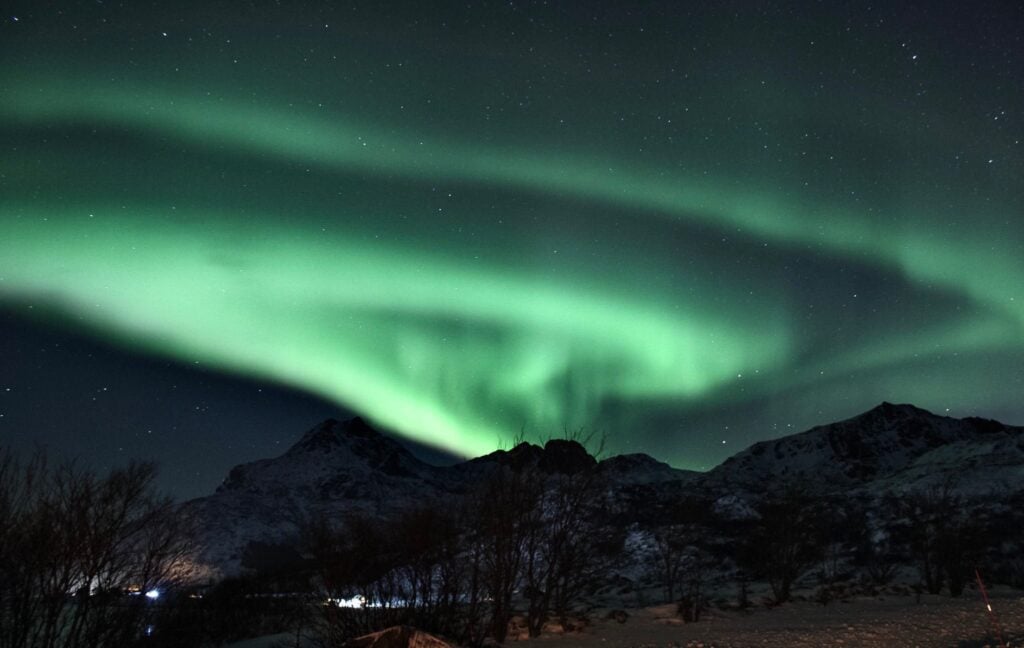
Lofoten in winter is like driving through a fantasy novel. Snow-covered peaks drop straight into the ocean, traditional red fishing cabins dot the shoreline, and the northern lights reflect off both mountains and sea. The E10 highway in February is 170km of pure magic. You’re driving past otherworldly landscapes – white coral beaches that look tropical but are in the Arctic, fishing villages with red cabins on stilts, and mountains that rise vertically from the ocean
For the most epic experience imaginable, I recommend The Aurora Jäger Experience, led by legendary local guide Odd-Petter Tanke Jensen who goes by “The Aurora Jäger” (The Aurora Hunter). This guy is basically the aurora whisperer of Lofoten with a 95%+ success rate finding the northern lights and people literally traveling from all over the world just to tour with him.
Lofoten sits directly under the “aurora oval” – the magnetic belt that gives you the best chances worldwide of seeing northern lights. The dramatic peaks provide incredible foregrounds, so you’re not just getting green lights, you’re getting them reflected off fjords and framed by jagged mountains rising straight from the sea
Book Your Trip:
- Car Rental: Avis Leknes Airport – 4WD essential, from €45/day
- Alternative: Hertz Svolvær – Downtown pickup option
Iconic Accommodation:
- Nusfjord Rorbu – Historic fishing cabins from €180/night
- Reine Rorbuer – Waterfront cabins with aurora views from €220/night
- Svinøya Rorbuer – Traditional stilted cabins from €160/night
Epic Stops You Have to See:
- Reine Village – Most photographed village in Norway
- Hamnøy – Classic red cabins with mountain backdrop
- Uttakleiv Beach – White sand beach (yes, in the Arctic)
- Nusfjord – Preserved fishing village, tentative UNESCO site
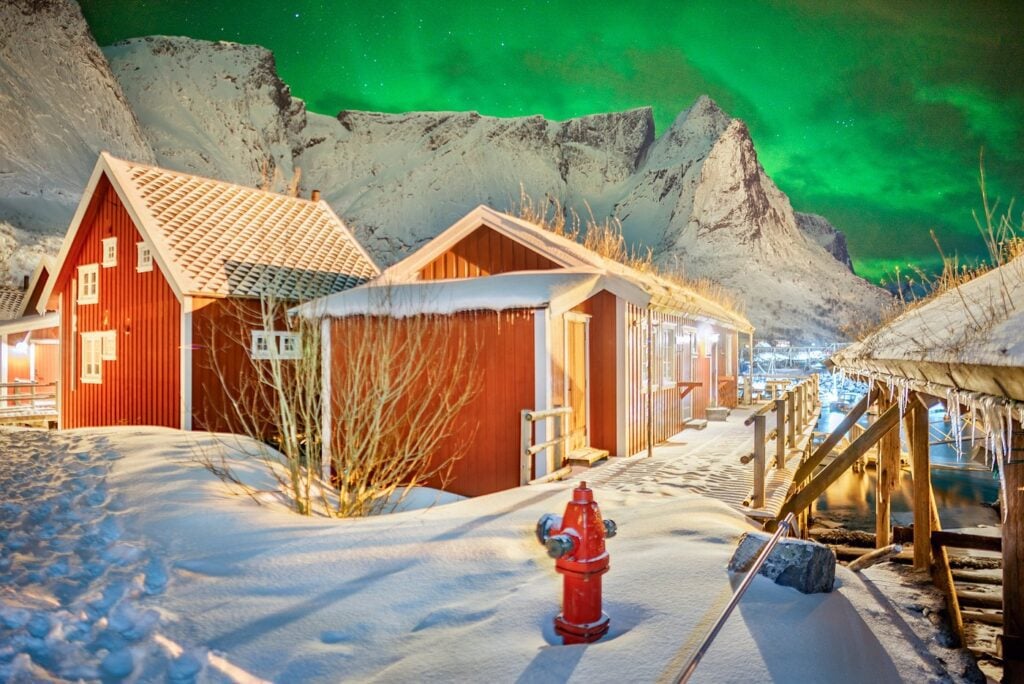
10. Glaciers, Fjords and the Northern Lights in Greenland (Quark Expeditions)
Experience one of the Arctic’s most remote and untouched destinations where aurora visibility is legendary.
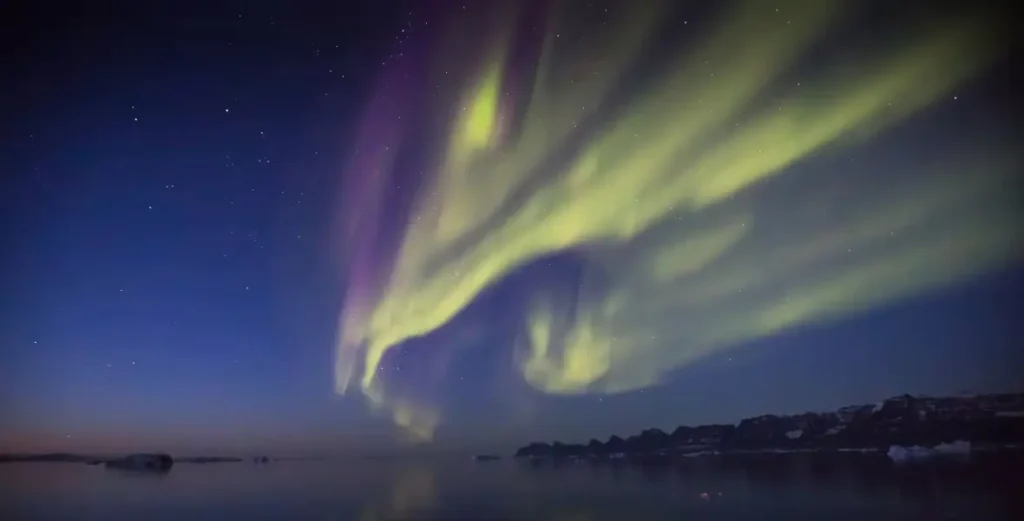
This isn’t your typical aurora hunt. Quark’s 11-day expedition takes you to the world’s largest fjord system in Northeast Greenland, where the northern lights dance over landscapes so remote that 40% of the world’s muskoxen population roams undisturbed.
You’ll cruise through Scoresby Sund aboard the purpose-built Ocean Explorer (138 passengers), watching aurora reflect off house-sized icebergs in complete darkness – zero light pollution. The ship features two outdoor Jacuzzis (popular for aurora viewing), a two-story panoramic library, modern Scandinavian cabins with private verandas, plus a gym and sauna. Shore landings include Ittoqqortoormiit, East Greenland’s northernmost community (350 residents), and ancient Thule archaeological sites.
This is serious expedition cruising to one of Earth’s most remote regions. Weather and ice dictate the itinerary. You’ll need high fitness for Zodiac landings and Arctic conditions.
Getting There: Fly to Reykjavik, Iceland, where the expedition begins and ends. Quark includes one night at a Reykjavik hotel before departure.
Cost: From $10,200-$12,000 per person including meals, accommodations, expeditions, and gear. Quark offers $1,000 early booking bonus for 2025.
Essential Resources:
- Quark Expeditions Direct Booking
- Alternative: Intrepid Travel
- Ocean Explorer Ship Details
- Quark Arctic 2025 Overview
- When to Visit Greenland for Northern Lights
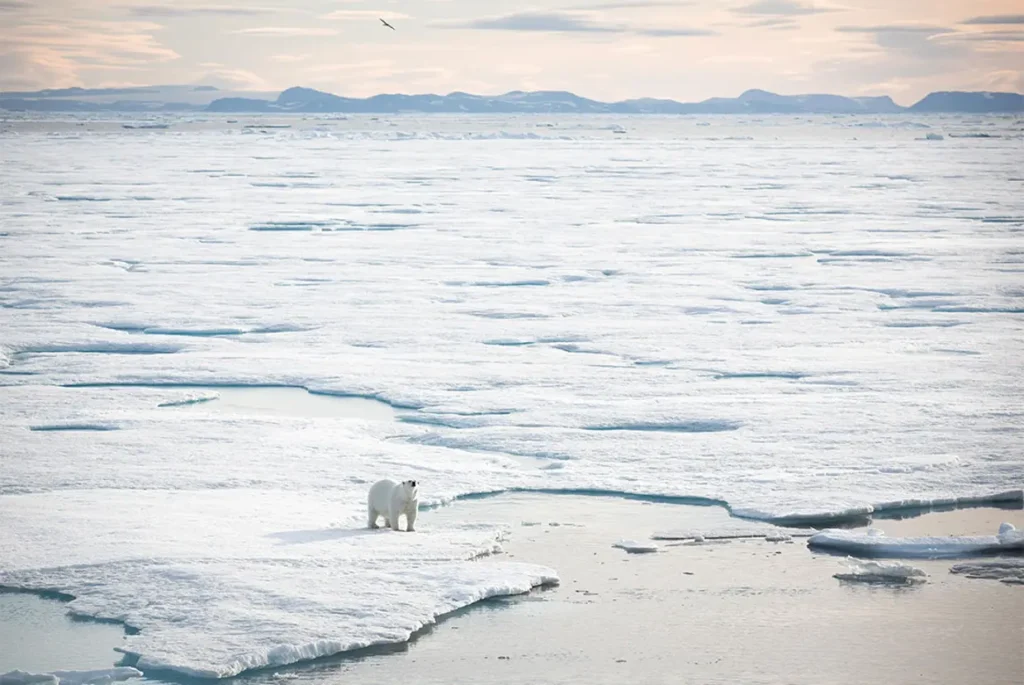
11. Hot Springs Under the Aurora: Alaska’s Hidden Gem
Soak in natural 106°F hot springs while watching auroras dance overhead in complete wilderness isolation.
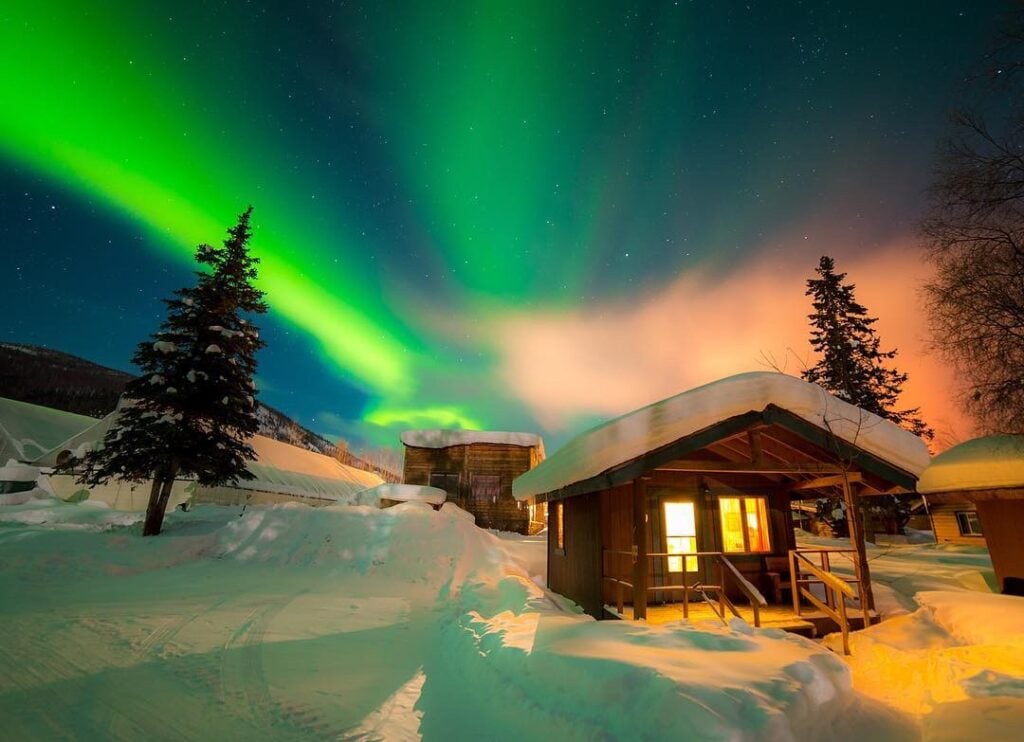
Picture yourself soaking in natural hot springs with epic views of the Northern Lights. This is Chena Hot Springs Resort, located 60 miles from Fairbanks in complete wilderness isolation.
This geothermal resort offers the world’s most unique aurora viewing experience. The contrast between the hot springs and frozen landscape, combined with aurora reflections in the water, creates photography opportunities you literally cannot find anywhere else on Earth. The resort features an Ice Museum with an ice bar, renewable geothermal energy powering the entire facility, dog mushing experiences, ice fishing, and aurora photography classes taught by professional photographers.
Standard rooms start at $169/night, while Aurora cabins with hot springs views run $299/night. Budget travelers can book dry cabins (shared bath) from $89/night. Day visits cost just $15 for hot springs access. The resort provides shuttle service from Fairbanks for $79 per person round trip.
- Book Direct: Chena Hot Springs Resort
- Alternative: Daily Hot Spring Passes starting at $17, which includes access to the indoor heated pool & indoor and outdoor hot tubs
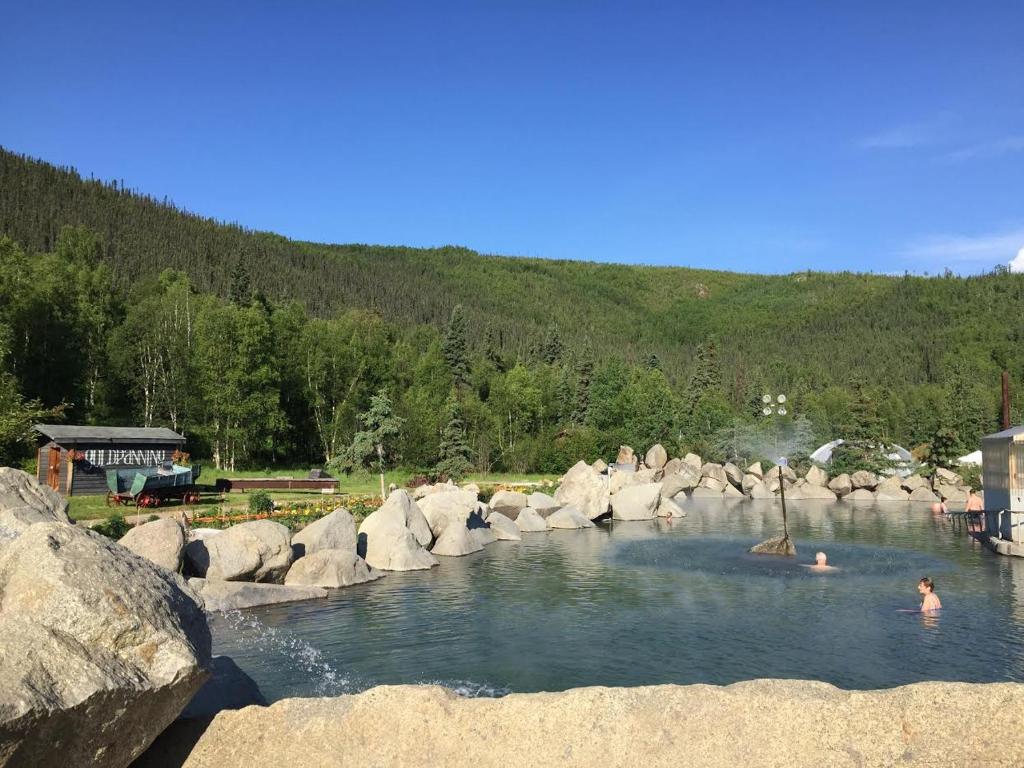
12. Dog Sledding Under the Northern Lights (Finland/Norway/Sweden)
The only aurora experience where you’re actively part of the adventure, not just watching from the sidelines.
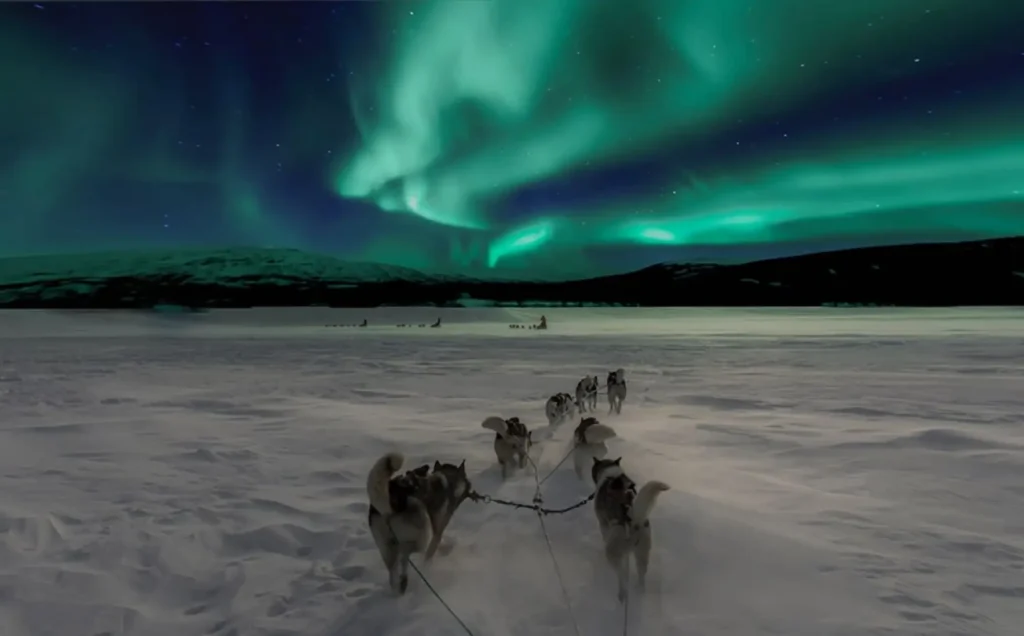
This is the ultimate “only in the Arctic” experience. Picture yourself standing on wooden runners behind a team of eager huskies, headlamp cutting through Arctic darkness, when suddenly the sky explodes in green ribbons above you. The dogs sense your excitement and pick up speed, their paws creating the only sound in the pristine wilderness as the aurora dances overhead.
Dog sledding under the northern lights combines two of the Arctic’s most iconic experiences into one adventure. The contrast is magical…the dogs’ energy and excitement, the whoosh of runners on fresh snow, then complete silence when you stop to watch the lights paint the sky. It’s a sensory overload in the best possible way. Here’s what I loved learning the most: the dogs can sense the aurora’s electromagnetic activity and become more excited when the lights appear. Many guides say the huskies are their best aurora predictors.
Getting There: Multiple departure points across Scandinavia. Finland’s Lapland region (fly to Rovaniemi or Kittilä airports), Swedish Lapland (Kiruna airport), or Northern Norway (Tromsø, Alta, or Kirkenes airports). Most operators provide transfers from airports or city centers.
Experience Options:
- Nature Travels – Multi-day expeditions across Scandinavia (book early – most dates sell out far in advance)
- Hetta Huskies Finland – 1.5-hour evening safaris (€175 adults, €125 children)
- Aurora Borealis Adventures Sweden – Glass tepee overnight packages with dog sledding
- Norwegian Travel Kirkenes – Arctic coastal experiences ($227-500 USD)
13. Canada’s Ultimate Fly-In Aurora Experience
A fly-in wilderness lodge accessible only by chartered plane, positioned in the middle of Canada’s aurora oval.
This is aurora viewing at its most remote and spectacular. Imagine boarding a bush plane in Yellowknife and flying 25 minutes over endless boreal wilderness to a lake accessible only by air. No roads, no light pollution, no civilization for hundreds of miles…just pristine northern wilderness and some of the most intense aurora displays on Earth.
The Northwest Territories sits directly under the “auroral oval,” giving these remote lodges a 98% chance of aurora sightings during a 3-night visit. When the lights appear, you can watch them from your lakeside cabin, an outdoor hot tub, or while relaxing by a campfire. The aurora often reflects perfectly off the frozen lake surface for double the visual impact.
The Ultimate Remote Experience: Blachford Lake Lodge operates as the only wilderness resort on this remote 17-kilometer lake, 100 kilometers from Yellowknife. With just 8 guest rooms total and a maximum of 16 visitors at any time, you’re guaranteed solitude and unobstructed aurora viewing. The lodge offers “Aurora Wake-Up Service”…staff will wake you when the lights appear, so you never miss a display.
Getting There: Fly into Yellowknife (daily flights from major Canadian cities), then take a 25-minute chartered bush plane or floatplane to the lodge. Most operators include airport transfers and pre-departure briefings.
Helpful Planning Resources:
- Blachford Lake Lodge – The definitive fly-in aurora experience
- Spectacular NWT – Comprehensive booking information
- Northwest Territories Tourism – Official territory aurora information
Current Pricing (2025)
- 3-night packages from $1,100 CAD per person (fall season)
- Winter packages from $1,400 CAD per person
- Includes charter flights, all meals, accommodation, activities, and aurora photography instruction
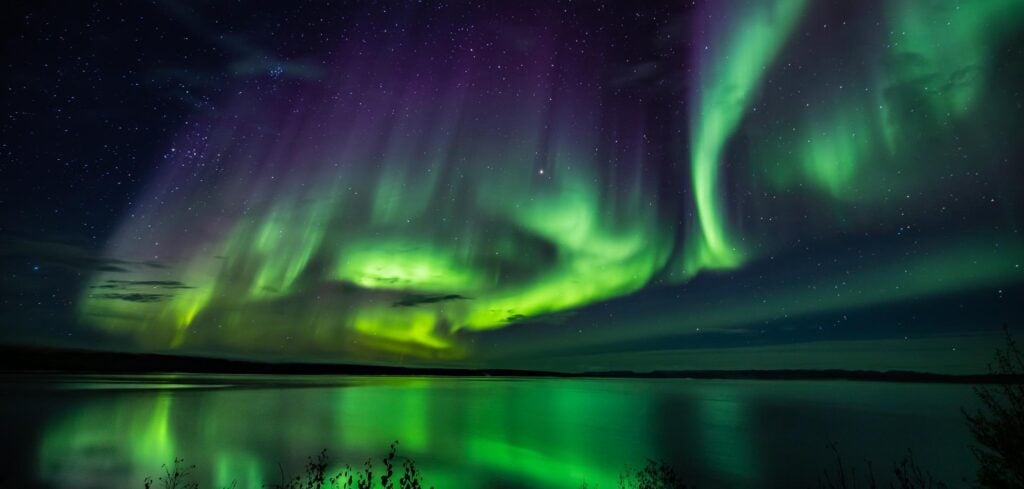
14. Finnish Wilderness Aurora Cabin Experience
Remote heated cabins accessible only by snowmobile, positioned in Lapland’s wilderness far from any roads or civilization.
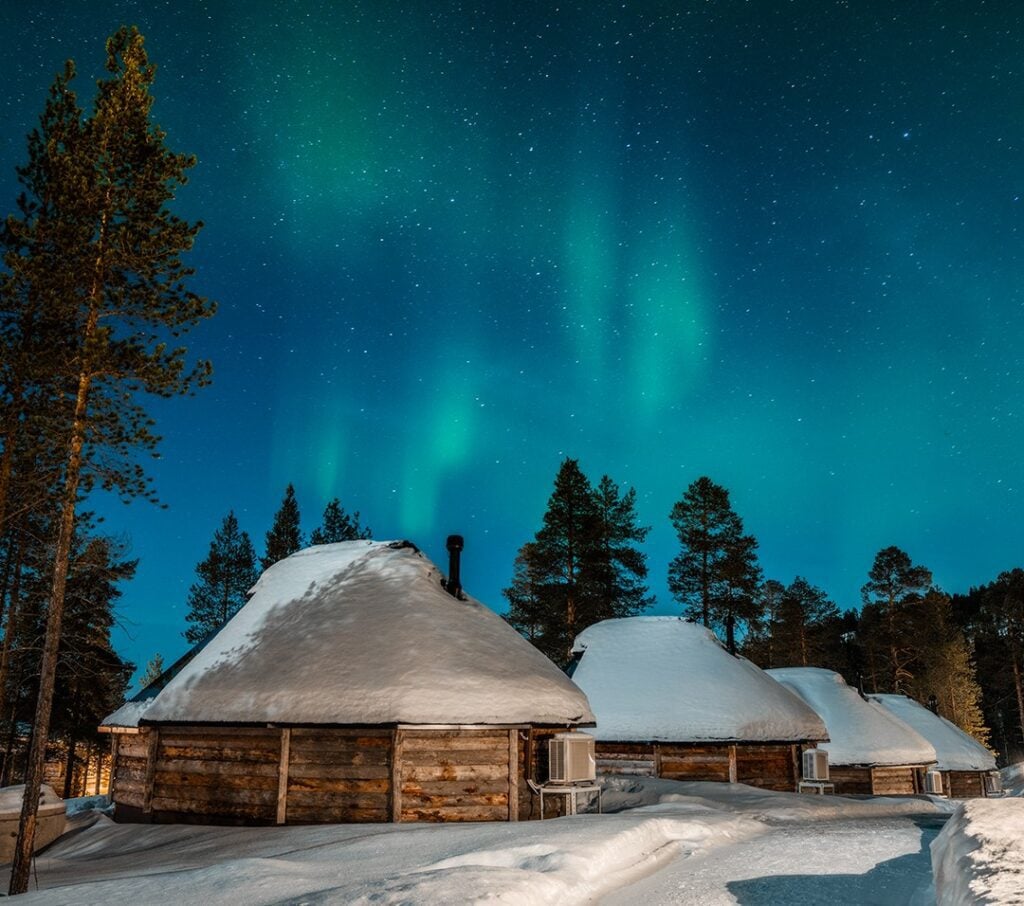
You’re lying in a warm bed, gazing up through heated glass at the dancing green curtains of the Aurora Borealis, while snowy pines frame your view in complete Arctic silence. This is the magic of Finland’s wilderness aurora cabins…a step beyond the typical glass igloo experience.
Finnish aurora cabins combine traditional log construction with heated glass ceilings. Places like Wilderness Hotel Nangu sit 30+ minutes from civilization on the shores of Lake Inari, while Aurora Village Ivalo offers cozy cabins with laser-heated glass roofs that prevent snow buildup for crystal-clear aurora viewing. The Northern Lights are visible roughly 200 nights a year in Finnish Lapland, making this one of Earth’s most reliable aurora destinations.
The December-March sweet spot offers the deepest snow and most established access routes. At Wilderness Hotel Inari, aurora cabins on the lake start from €250/night, while premium forest locations like Arctic TreeHouse Hotel run €530+ nightly.
You’ll fall asleep to absolute silence, wake to reindeer tracks outside your door, and experience traditional Sami culture through storytelling and local cuisine. The heated glass technology means you never miss a celestial show…even if it’s -30°C outside, you’re watching from your cozy bed.
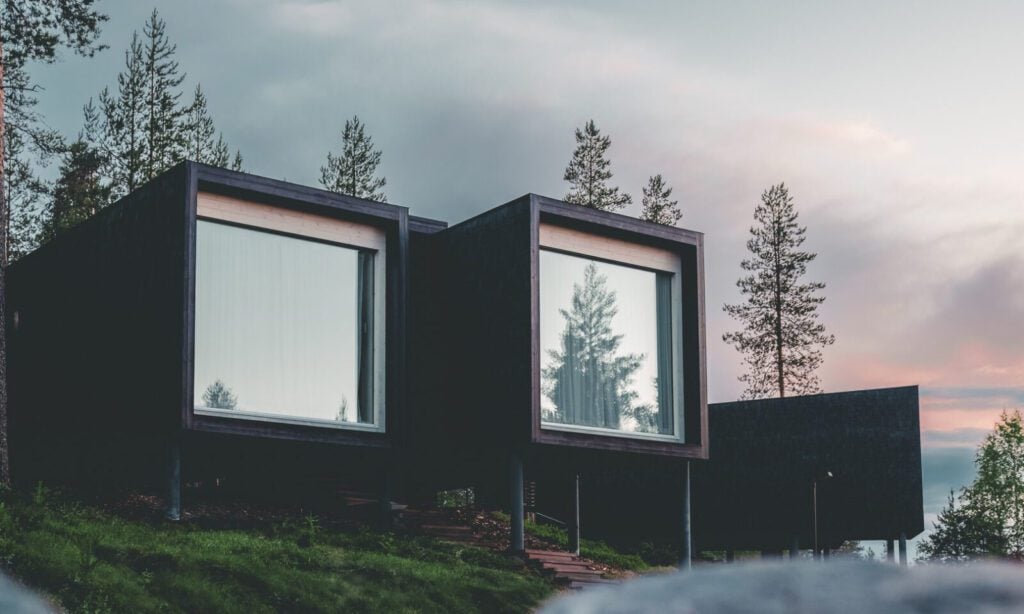
15. Anchorage Aurora Photography Tour
A small group photography-focused tour where you can learn new photography skills while capturing the Northern Lights
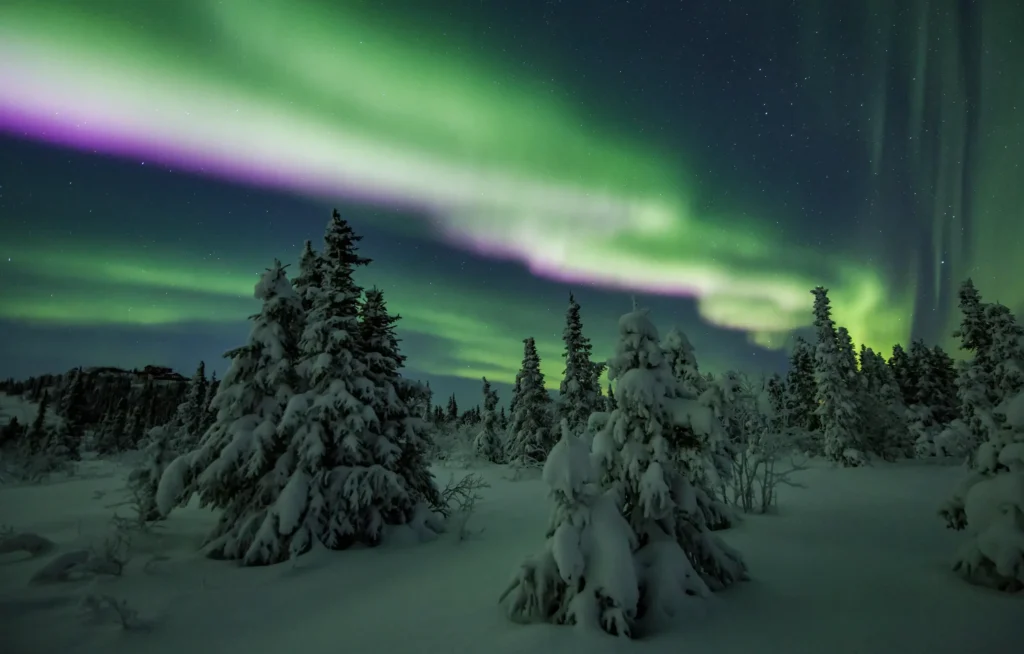
Northern Lights photography tours offer one of the most rewarding ways to experience the aurora because you leave with epic memories captured forever, plus guides who are incredibly knowledgeable about both the science and art of aurora hunting. While you can find these specialized photo tours across every major Northern Lights destination from Swedish Lapland to Canadian territories, Alaska Photo Treks’ Anchorage Aurora Tour stands out for its unique urban-to-wilderness approach.
Operating from Alaska’s largest city, this 6-hour nocturnal adventure proves you don’t need complete isolation to witness spectacular aurora displays. Professional photographer guides like Ben, Chad, and Colin take small groups (maximum 10) on strategic routes from Palmer to Hatcher Pass, teaching optimal camera settings while capturing professional portraits of you with the Northern Lights backdrop.
What makes this tour exceptional is the 80% success rate achieved through intelligent location scouting rather than luck. Guests consistently rave about guides who drive hours through -26°F conditions to find clear skies.
At $315 for six hours, the experience includes tripods, photography instruction, professional group portraits, and comfort amenities like heated vans and hot chocolate. The company’s integrity shines through their policy of canceling tours when conditions aren’t favorable rather than taking your money for poor viewing. Book early in your Alaska visit to allow rescheduling flexibility…this experience typically books out 50+ days in advance.
- Other popular photography workshops and tours: The Aurora Chasers & Tromso Northern Lights Tour
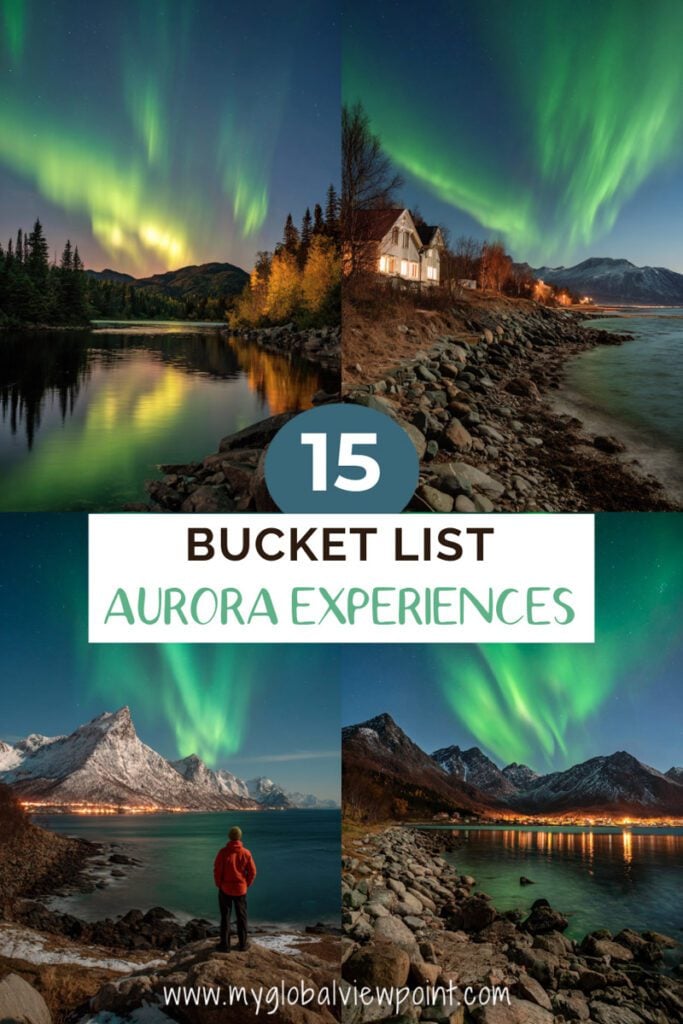
- Read next: My Favorite Aurora Locations in North America
- You may also like: The Best Northern Lights Destinations in Europe
- For further reading: Most Beautiful Aurora Airbnbs in 2025
Global Viewpoint is a personal blog. All content is for informational and entertainment purposes only and does not constitute professional financial, medical, or legal advice.


